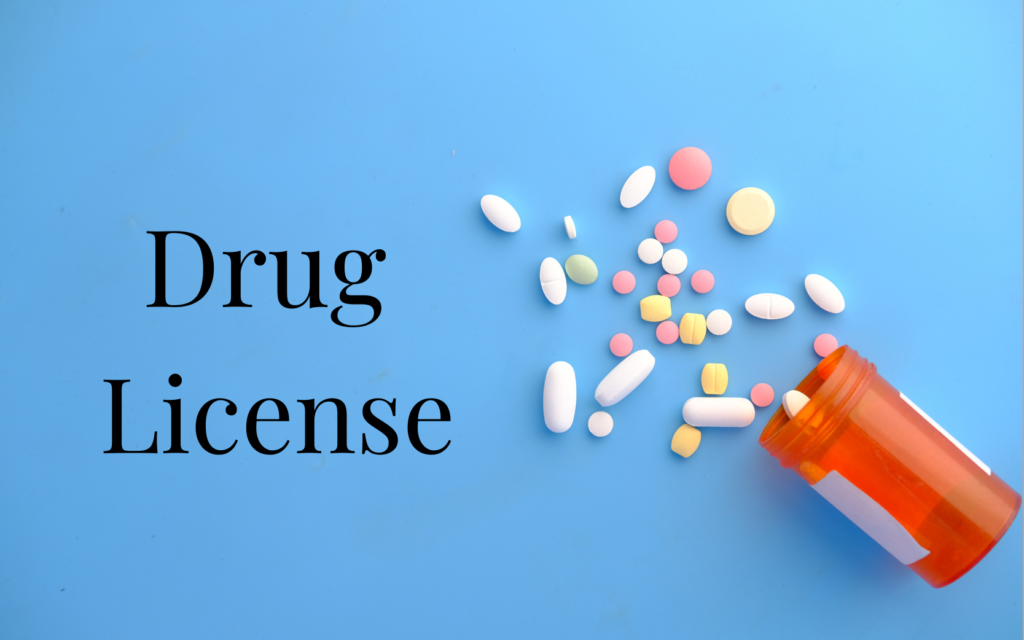Want Drug License ??
Drug License
A drug license is a legal permit granted by government authorities to individuals or entities involved in the manufacturing, distribution, sale, or storage of pharmaceutical products and medicines. It ensures compliance with regulatory standards and guidelines, including safety, quality, and efficacy, to protect public health. Obtaining a license involves meeting specific criteria, such as facility requirements, personnel qualifications, and documentation, as mandated by regulatory agencies. It is essential for businesses operating in the pharmaceutical industry to obtain the appropriate drug license to ensure lawful operations and maintain consumer trust.

Documents Required for Drug License Registration
The specific documents required for drug license registration can vary depending on the jurisdiction and the type of license being sought. However, here is a general list of documents commonly needed for the registration process:
Application Form: A duly filled and signed application form for license registration.
Proof of Identity: Identification documents such as Aadhaar card, passport, or voter ID card for the applicant and authorized signatories.
Proof of Address: Documents verifying the registered office address of the pharmaceutical business, such as a lease agreement, rent receipt, or utility bill.
Layout Plan: A layout plan of the premises showing the dimensions, storage areas, and facilities for storage and handling.
Site Master File: A detailed document describing the layout, facilities, equipment, and processes involved in drug manufacturing, if applicable.
Proof of Ownership or Possession: Documents proving ownership or legal possession of the premises where drug-related activities will be conducted.
Affidavit or Declaration: Affidavit or declaration stating compliance with relevant laws, regulations, and standards, along with the non-conviction of the applicant or authorized signatories.
No Objection Certificate (NOC): NOC from the owner of the premises if it is rented or leased.
GMP Certificate: Good Manufacturing Practices (GMP) certificate for manufacturing units, ensuring compliance with quality standards.
License Fee Payment Receipt: Proof of payment of the prescribed license fees.
Technical Staff Qualifications: Qualification certificates of technical staff involved in drug manufacturing or handling.
Equipment Calibration Certificates: Certificates of calibration for equipment used in drug manufacturing or testing.
Product Details: Details of the drugs to be manufactured, distributed, or sold, including their composition, dosage forms, and intended use.
Other Regulatory Approvals: Copies of any other regulatory approvals or clearances required for drug-related activities.
It is important to verify the specific requirements with the local drug regulatory authority or licensing agency to ensure completeness and accuracy of the documentation for successful license registration.
Benefits of Registration
Registering for a drug license offers numerous benefits for individuals and entities involved in the pharmaceutical industry. Here are some key advantages:
Legal Compliance: Obtaining a license ensures compliance with regulatory requirements, demonstrating a commitment to operating within the bounds of the law.
Consumer Trust: A license enhances consumer confidence in the quality, safety, and efficacy of pharmaceutical products, thereby fostering trust and credibility in the market.
Market Access: Holding a drug license allows businesses to legally manufacture, distribute, sell, or store pharmaceutical products, granting access to wider markets and distribution channels.
Quality Assurance: license registration involves adherence to stringent quality standards and guidelines, ensuring that products meet specified quality parameters and are safe for consumption.
Public Health Protection: By regulating the manufacture and distribution of pharmaceutical products, drug license registration helps safeguard public health and prevent the proliferation of substandard or counterfeit drugs.
Business Expansion: With a valid drug license, pharmaceutical businesses can explore opportunities for expansion, diversification, and collaboration within the industry, driving growth and competitiveness.
Competition Advantage: Having a drug license can confer a competitive advantage by distinguishing licensed businesses from unlicensed or non-compliant entities, thereby enhancing market credibility and reputation.
Government Contracts and Tenders: Many government procurement processes require suppliers to hold valid drug licenses, making registration a prerequisite for participating in lucrative government contracts and tenders.
Risk Mitigation: Drug license registration helps mitigate legal, financial, and reputational risks associated with operating in a highly regulated industry, providing protection against penalties, fines, and legal liabilities.
Professional Recognition: Holding a drug license signifies professionalism, integrity, and commitment to quality in pharmaceutical operations, enhancing the company’s standing and reputation within the industry and among stakeholders.
Conclusion
In summary, drug license registration offers a host of benefits, including legal compliance, consumer trust, market access, quality assurance, public health protection, business expansion, competitive advantage, access to government contracts, risk mitigation, and professional recognition. It is an essential requirement for conducting pharmaceutical activities and is instrumental in ensuring the integrity, safety, and efficacy of drugs in the market.

Thank you for your articles. I find them very helpful. Could you help me with something?